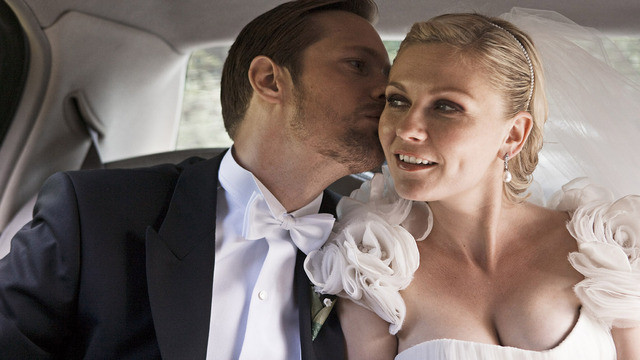Melancholia is Monumental.
I saw it last night at the Bytowne. David Edelstein's right Chris. But to me it doesn't border on sublime. It is.
The whole thing is overwhelming. Some will say infuriating, maddening. But that's why I love Lars von Trier.
He will impose his will on you with his camera.
I was in my element watching this profound work of Art.
I could tell by the uneasy vibe in the theatre that this movie was not making friends.
This one is on par with 2001: A Space Odyssey. That's how large the scope is.
If it isn't nominated for Best Picture then there's no hope for the Academy.
Kirsten Dunst should get a Best Actress Oscar. Give it to her now.
She gave her all (and bared her all!) for this film, and I wanted to stand up and applaud when it was over.
But no one in the theatre BREATHED or MOVED when that ending hit.
After a few seconds of silence over the end credits, some guy at the back yelled "WOOOO!"
Everybody laughed.
What a colossal ending. Definitely not as happy or positive as Tree of Life.
The beginning sequences (leading up to the art scrawl of Trier's titles) were incredible, some of the best cinematic images and ideas I've ever seen. Mysterious, beautiful, haunting, Alain Resnais would be proud.
Udo Kier is a treat to watch. Yes, this movie is gloomy and doomy, but Udo provides some nice laughs. There is quite a bit of humour here, if you're paying attention. Melancholia (the mood and the planet) pervades everything, but human emotions and needs and desires and tics are all explored in the face of total oblivion.
The climax was not the planet hitting earth.
The climax to me was when Justine says having a glass of wine on the patio as a final act is a fucking stupid idea.
That scene zeroes in on Trier's point: we are alone. And no one will care when we're gone. The human race, for all it's positive traits, is actually quite evil and deserves to be incinerated. Many are up in arms over that notion, but I, for one, was overjoyed to see a magnificent work of cinematic art exploring the idea. Even if it is through the eyes of one man, one mad genius egomaniac like Lars von Trier.
Outstanding cast, which includes Kiefer Sitherland and Charlotte Rampling, who almost steals the movie, with her short scenes.
I'd love to have a tea with her and pick her brain...
Overall, this film is Monumental. A Masterpiece. One of the greatest pieces of Art I've ever sat in front of.
But I don't know if I could sit through it one more time.
Trier is almost too intense for me.
Last edited by Johann; 12-02-2011 at 12:46 PM.
"Set the controls for the heart of the Sun" - Pink Floyd





 Reply With Quote
Reply With Quote
Bookmarks